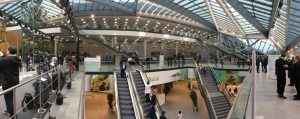
The ‘Bula’ Negotiations Zone at COP 23
The 23rd Conference of the Parties has now concluded, and left some significant takeaways. The event produced several headlines, from Syria joining the Paris agreement to notable presentations from Al Gore, Angela Merkel and a U.S. group supporting continued use of coal. The bulk of the event happened outside these publicized events however, in negotiation rooms where more finite and intricate policies are shaped. While negotiators pushed many tough questions into next year, delegations attempted to define the rulebook for Paris implementation, and began to delve into larger questions such as a carbon trading mechanism and transparent reporting.
From a US perspective, this was an interesting COP. It was the first since President Trump’s election and subsequent announcement of intent to withdraw from Paris, and both domestic and international players had questions on the United States’ new position. An unofficial coalition of primarily democrat subnational actors pitched tents just yards from the offices of the national delegation from the Trump Administration. The opportunity to meet with both groups showed me how the US sends a mixed message to the world on climate change, yet these groups’ positions may not be as fundamentally antagonistic as portrayed in the media.
The COP is a collection of many events, private and public, official and unofficial, but the variety of which is incredibly important. While the negotiations of the Paris Agreement rulebook take place, the COP serves an equally if not more important role serving as a marketplace of ideas. Countless new concepts, techniques, case studies and prototypes are brought to one place as policymakers, scientists, activists and citizens try to tackle one of humanity’s most existential problems. Some progress will be made through successful implementation of Paris Agreement goals. But much more needs to be done than what is possible through Paris, and the next solution will be born out of innovation from knowledge sharing events like the COP.
Being partnered with IUCN, I was able to see how a non-governmental institution attempts to affect policies at this event. While the larger organization had several policy interests, my team spent the week highlighting the benefits of one concept, ecosystem-based adaptation. Through a variety of side events, IUCN promoted EbA techniques, brought together students and experts in the field, and discussed means for improvement in the field.
A common focus throughout many fields was the need for capacity building and improved knowledge sharing. Developing international platforms to connect researchers with local policy actors and project implementation remains equally important as any technological advancements. The COP as a whole naturally promotes a mood of increased cooperation and knowledge sharing, as a mulitinational, multisectoral event. In this way the spirit of the COP is important towards environmental progress each year, even in years without major developments within the negotiations themselves.